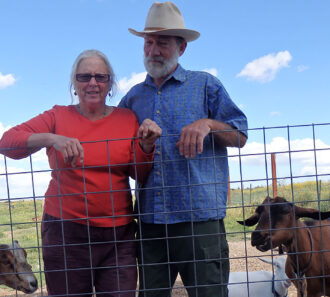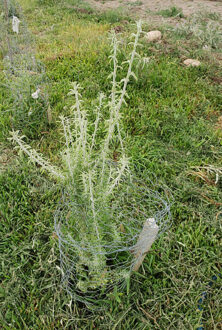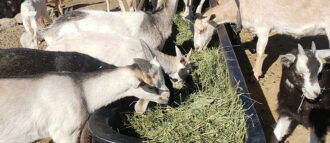MARFA, Texas – Visitors to Big Bend Country in far West Texas come for the desert mountain views, mystery lights in the sky, a burgeoning art culture…and Malinda Beeman’s goats.
Beeman and her partner Allan McClane run Marfa Maid Dairy – a 25 dairy goat herd operation where they sell artisan cheeses and give weekly farm tours. “Tourism is a big thing in Marfa. We do better with the tours than we do selling the cheese, and our cheese is pretty good,” laughed Beeman.

Beeman is an artist and art teacher by trade. Her work reflects images of her goats, landscapes around the farm, and close-ups of plants and insects. McClane is a self-proclaimed jack-of-all-trades. He’s been a social worker, special education teacher, motorcycle restorer, volunteer firefighter, has a background in construction, and once worked on a dairy farm. He built the dairy facility on their 10-acre property, which started out as an organic garden 15 years ago. The vegetable stand on the farm eventually morphed into a farmers’ market in town, which Beeman is still involved in today.
“We were looking to include value-added products to what we offered at the farmers’ market and came up with the idea of getting goats to make cheese,” said Beeman.
Marfa Maid Dairy sits at the end of a long dirt road on the edge of town, overlooking an expansive rugged plateau with mountains rising above in the distance. It’s not uncommon to spot wild llamas browsing the short grasses and brush. It’s a beautiful, yet forbidding environment prone to wild temperature swings and water limitations which pose challenges for Beeman and McClane to keep their business profitable.
“The greatest problem we have faced as a small dairy is the cost, quality and availability of feed. The goats generally eat alfalfa, but that takes a lot of water, and water is a premium here. Because of the arid area, we have to purchase all of our feed. We have struggled with the disproportionate cost of attaining good quality feed in relationship to our narrow profit margin. Being in such a remote location, we are apt to get feed that is not fresh or even poor quality at exorbitant prices,” said Beeman. “So we wanted to look at feed alternatives, something that takes less inputs, is more drought tolerant and is suitable for our environment.”
She applied for and received a Southern Sustainable Agriculture Research and Education (SSARE) Producer Grant to study tagasaste – a fast-growing small evergreen tree grown extensively in Australia and New Zealand as fodder that thrives in poor soils, is drought tolerant and is highly nutritious for livestock.

“Tagasaste is something they grow in West Australia, which has a similar climate to West Texas, so I wanted to explore the possibilities of growing it here as a drought tolerant, nutritious feed for the goats,” said Beeman.
She acquired seed and started the plants in her greenhouse. It took about 3 weeks for the seeds to germinate. The plants overwintered in the greenhouse, growing about 18 inches tall, and were transplanted in the ground in the spring.
“The trees did great that summer. They grew up to 3 feet high. That following winter we had several strong winter storms and low temps, but the plants were watered and kept protected. They did lose their leaves, but the stalks still seemed supple and green,” said Beeman.
Then the historic winter storm of February 2021 brought snow, sleet, freezing rain and extreme cold temperatures to Texas. “We lost all of the plants,” said Beeman. “The best we could do was to make sure the plants were watered and covered to keep alive.”
Beeman said that despite the loss of the plants, the SARE project was not a failure.
“The most significant thing that came out of the project was that we received so many requests from farmers across Texas and western states like California asking for more information on tagasaste,” said Beeman. “This is a challenging area environmentally, and there are a lot of problems here that need to be solved. The SARE grant gave us a leg up in beginning to look for solutions. Agriculture is not the foremost business out here.”
Beeman said that she may once again try to establish tagasaste on the farm.
View Related SARE Grant:
- Tagasaste: A new feed source for West Texas (FS19-312)
